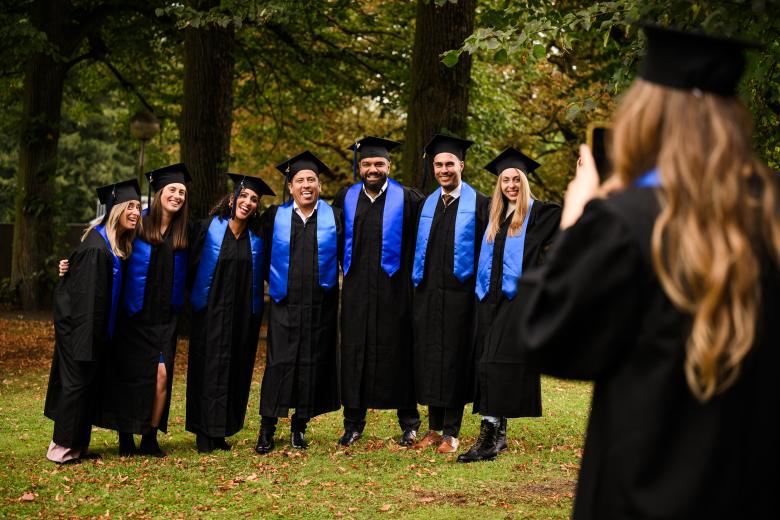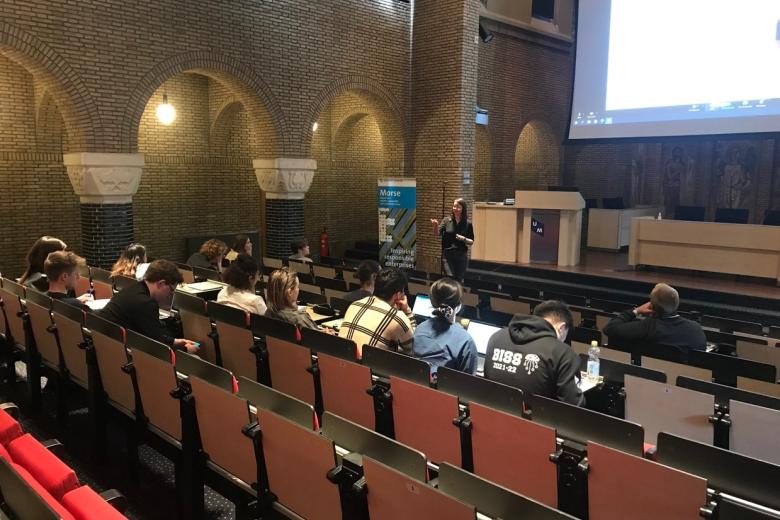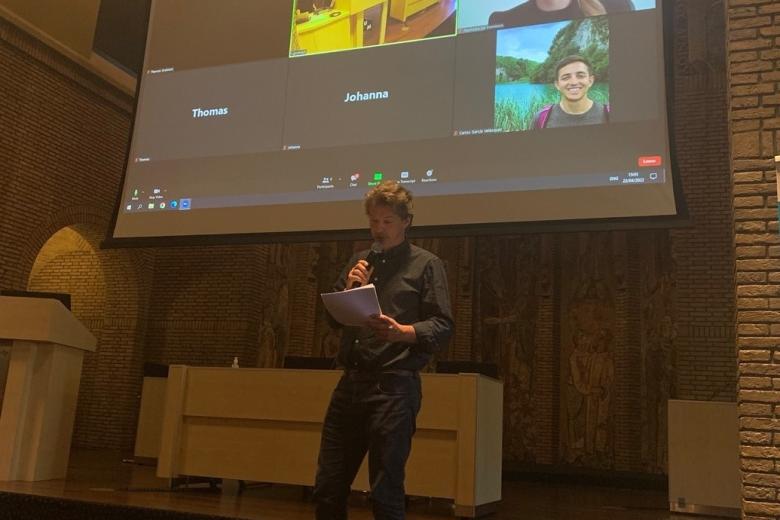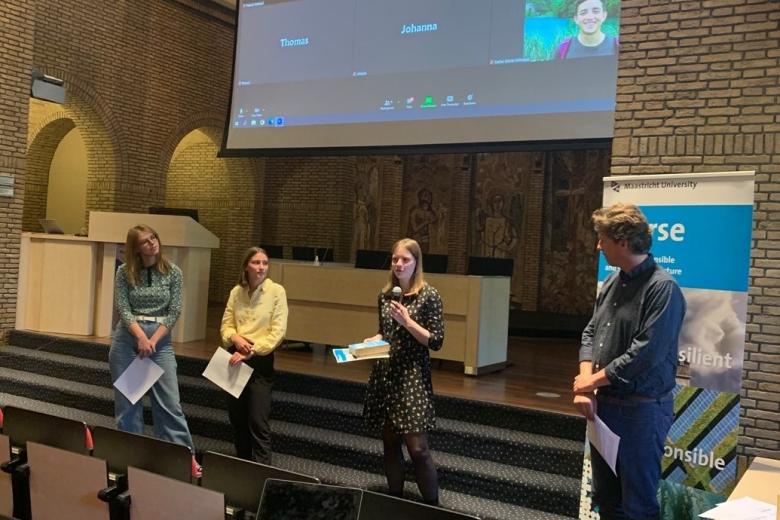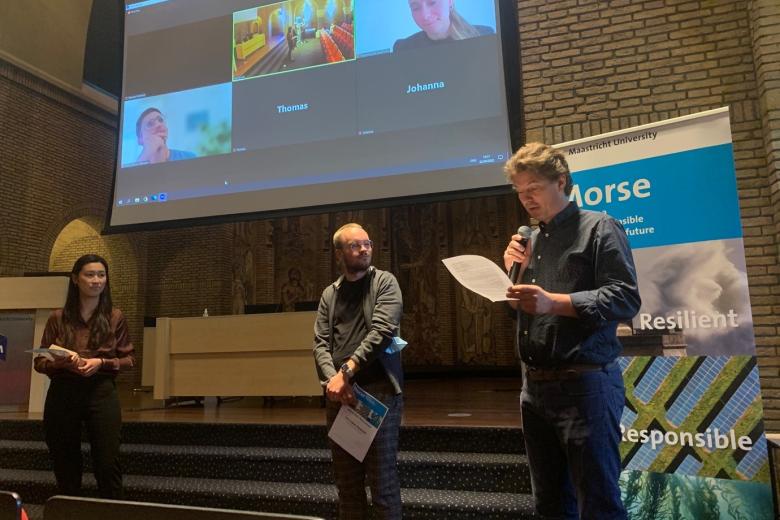MORSE 2021 Thesis Awards
On Friday, April 22, the MORSE 2021 Thesis Awards ceremony took place where students received recognition for the impact that their thesis would have on society. With this ceremony, MORSE hopes to reward students who go the extra mile with their thesis, but also to motivate and teach students who wish to do so in the future.
The event began with a welcoming speech by Prof. Dr Mark Sanders, giving the floor to Dr Therese Grohnert (coordinator of master´s theses, thesis supervisor teaching, and connecting theory with practice in her own research in the field of accounting).
The interactive lecture covered the following topics: (1) What is an impactful thesis topic? (2) How to approach the planning phase of writing an impactful thesis? (3) How to continue creating an impact while working on the thesis? (4) How to continue having an impact through interaction after finishing the thesis?
First, Dr Grohnert pointed out the importance of addressing a topic that is highly relevant to many people, so questions such as "Who is interested?" and "Who is interested in the topic?" need to be asked. Second, she asked the question of "where to find relevant information on the topic?". Dr. Grohnert mentioned as sources e.g. empirical values, research on emotionally affected persons, previous work on similar topics or engagement with the relevant network. She stressed that conversations with people who are emotionally affected by the research topic often reveal good directions for research and connecting theory and practice. Third, Dr. Grohnert provided the audience with some tips and tricks on how to make an impact while writing a thesis. Moreover, she asked questions to pose when framing the results, for instance “can these recommendations actually be translated into practice?” Fourth, she stressed the importance of sharing your findings with stakeholders or parties relevant to the issue.
For the recording of the lecture, click here.
For the slides presented, click here.
The Awards Ceremony
The second part of the event was dedicated to the awarding of the 2021 MORSE thesis awards.
For this year’s first MORSE-thesis award, the jury received 13 nominations, all of which were read with great interest and pleasure and the jury, consisting of Ann Vanstraelen, Jonas Wogh, Trudie Schils, Simon Beausaert and Mark Sanders, would like to congratulate all nominees for their excellent and highly impactful theses!
The impressive studies exhibit a wide variety of disciplines and approaches, from which the jury had to compare qualitative and quantitative research on topics ranging from security mindset in psychology to life cycle analyses comparing new feedstock to create biofuels for shipping.
The wide range of work was carefully evaluated for its fit with the MORSE themes and its potential societal impact, from which the jury first drew up a shortlist. This resulted in a shortlist of three MSc and three BSc theses.
The winner of the bachelor's thesis is Anna-Lena Krause with “The relationship between air pollution and economic activity in the Netherlands”. Her two runners-up: Lucie Defauw with the “Environmental assessment of crude lignin oil blends with methanol for marine shipping” and Sophie Groenewegen with “Integrating SDG Critiques: A Critical Assessment of Maastricht University’s Sustainability Plans Using the Critiques on the Sustainable Development Goals”.
The winner of the master thesis is Michelle Gian, with “Comparative LCA study of two promising pathways to produce biobased TPA using Miscanthus.” The first runner up Jan-Lukas Pashek with “On the Relationship between FDI Inflows and Equitable Sustainable Development: A Three-Dimensional Approach” and the second runner up Rafaela DeDominicis with “Smartness matters: The impact of smartness on the containment of COVID-19 infection trends in cities”.
After all prize winners were invited to collect their prizes, a celebration with everyone took place at the Ad Fundum.
Also read
-
Riding the waves of change: From a summer vacation to a life that feels as good as it looks
For SBE alumna Victoria Gonsior, one spontaneous decision: trying surfing sparked a journey of self-discovery, leading her to redefine success, embrace joy, and build a career that aligns deeply with her values. From quiet beaches in Sierra Leone to coaching sessions rooted in purpose, Victoria...
-
SBE researchers involved in NWO research on the role of the pension sector in the sustainability transition
SBE professors Lisa Brüggen and Rob Bauer are part of a national, NWO-funded initiative exploring how Dutch pension funds can accelerate the transition to a sustainable society. The €750,000 project aims to align pension investments with participants’ sustainability preferences and practical legal...

-
Maastricht University recognised among top institutions in CEO Magazine’s 2025 Green MBA Rankings
We are proud to share that Maastricht University School of Business and Economics has been recognised as a top-ranked institution in the CEO Magazine 2025 Green MBA Rankings.
